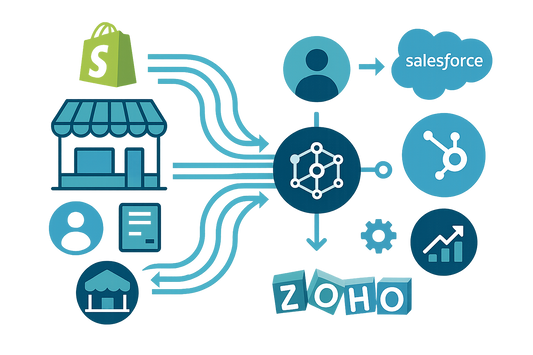SEO for Shopify: How to Rank Your Store on Google
Share
Optimizing product pages is a crucial aspect of Shopify SEO, and mastering this can significantly enhance your store's visibility on Google. As an online retailer, your goal is to ensure that potential customers can easily find your products when they search for relevant terms. To achieve this, it's essential to implement best practices that not only improve your search engine rankings but also provide a seamless shopping experience for your visitors.
To begin with, crafting compelling and unique product descriptions is vital. These descriptions should not only highlight the features and benefits of your products but also incorporate relevant keywords naturally. By doing so, you can help search engines understand the context of your products, making it easier for them to match your pages with user queries. However, it's important to avoid keyword stuffing, as this can lead to penalties from search engines and a poor user experience. Instead, focus on creating engaging content that resonates with your target audience.
In addition to well-written descriptions, optimizing product titles is another key factor. Your product titles should be clear, concise, and include primary keywords that potential customers are likely to use when searching for your products. A well-optimized title not only improves your chances of ranking higher on search engine results pages but also attracts clicks from users who find your listing relevant to their needs.
Moreover, high-quality images play a significant role in both user engagement and SEO. Ensure that your product images are clear, professional, and showcase your products from multiple angles. To further enhance SEO, use descriptive file names and include alt text for each image. Alt text not only helps search engines understand the content of your images but also improves accessibility for users with visual impairments.
Another essential practice is to optimize your product page URLs. Clean, descriptive URLs that include relevant keywords can improve your search engine rankings and make it easier for users to understand the content of your pages. Avoid using generic or complex URLs, as these can be confusing for both search engines and users.
Furthermore, leveraging customer reviews can significantly boost your Shopify SEO efforts. Reviews not only provide social proof and build trust with potential customers but also generate fresh, user-generated content that search engines value. Encourage satisfied customers to leave reviews and consider implementing a review system that allows for easy submission and display of feedback.
Internal linking is another powerful tool for optimizing product pages. By linking related products and categories within your store, you can help search engines discover and index your pages more effectively. Additionally, internal links can guide users to explore more of your offerings, potentially increasing the time they spend on your site and improving conversion rates.
Lastly, ensure that your Shopify store is mobile-friendly and loads quickly. With the increasing number of users shopping on mobile devices, having a responsive design is crucial for providing a positive user experience. Fast-loading pages not only reduce bounce rates but also contribute to better search engine rankings, as page speed is a known ranking factor.
In conclusion, optimizing product pages for Shopify SEO involves a combination of strategic content creation, technical enhancements, and user-focused improvements. By implementing these best practices, you can inspire confidence in your potential customers, improve your store's visibility on Google, and ultimately drive more traffic and sales. Embrace these strategies with enthusiasm, and watch your Shopify store rise in the ranks, reaching new heights of success.
Leveraging Shopify Apps for Enhanced SEO Performance
In the ever-evolving world of e-commerce, standing out in the crowded digital marketplace is crucial for success. For Shopify store owners, leveraging the right tools can make all the difference in enhancing SEO performance and achieving higher rankings on Google. Shopify, known for its user-friendly interface and robust features, offers a plethora of apps designed to optimize your store's search engine visibility. By strategically utilizing these apps, you can transform your online store into a powerhouse of SEO excellence.
To begin with, understanding the importance of SEO in driving organic traffic to your Shopify store is essential. SEO, or search engine optimization, involves optimizing your website to rank higher in search engine results, thereby increasing visibility and attracting potential customers. While Shopify provides a solid foundation for SEO, integrating specialized apps can significantly enhance your store's performance. These apps offer a range of features, from keyword optimization to site speed improvements, all aimed at boosting your store's search engine ranking.
One of the most effective ways to leverage Shopify apps for SEO is by focusing on keyword optimization. Keywords are the backbone of SEO, and using them strategically can propel your store to the top of search results. Apps like SEO Manager and Plug in SEO provide valuable insights into keyword performance, helping you identify high-performing keywords relevant to your products. By incorporating these keywords into your product descriptions, titles, and meta tags, you can improve your store's visibility and attract more targeted traffic.
In addition to keyword optimization, enhancing your store's technical SEO is crucial for achieving higher rankings. Shopify apps such as JSON-LD for SEO and Smart SEO automate the process of adding structured data to your store, making it easier for search engines to understand and index your content. This not only improves your store's visibility but also enhances the chances of appearing in rich snippets, which can significantly increase click-through rates.
Moreover, site speed is a critical factor in SEO performance, as faster-loading sites tend to rank higher on Google. Apps like Page Speed Optimizer and TinyIMG can help you compress images and optimize your site's loading speed, ensuring a seamless user experience. A faster site not only improves your SEO ranking but also reduces bounce rates, keeping potential customers engaged and more likely to make a purchase.
Transitioning from technical aspects to content creation, Shopify apps can also assist in generating high-quality, SEO-friendly content. Apps like Blog Studio and Shogun allow you to create engaging blog posts and landing pages that incorporate relevant keywords and provide value to your audience. By consistently producing informative and engaging content, you can establish your store as an authority in your niche, further boosting your SEO performance.
Furthermore, building backlinks is another effective strategy for improving your store's SEO. Apps like Backlink Manager can help you identify opportunities for acquiring high-quality backlinks, which are crucial for establishing your store's credibility and authority in the eyes of search engines. By fostering relationships with other reputable websites and engaging in guest blogging, you can enhance your store's online presence and drive more organic traffic.
In conclusion, leveraging Shopify apps for enhanced SEO performance is a powerful strategy for any store owner looking to succeed in the competitive e-commerce landscape. By focusing on keyword optimization, technical SEO, site speed, content creation, and backlink building, you can transform your Shopify store into a search engine powerhouse. Embrace the potential of these apps, and watch as your store climbs the ranks on Google, attracting more customers and driving sales growth.
Building High-Quality Backlinks to Boost Your Shopify Store's Google Ranking
In the ever-evolving digital landscape, achieving a prominent position on Google’s search results is a coveted goal for any Shopify store owner. While there are numerous strategies to enhance your store's visibility, building high-quality backlinks remains a cornerstone of effective SEO. Backlinks, or inbound links, are links from other websites that point to your store. They act as endorsements, signaling to search engines that your content is valuable and trustworthy. Consequently, acquiring high-quality backlinks can significantly boost your Shopify store's Google ranking, driving more organic traffic and potential customers to your site.
To embark on this journey, it is essential to understand that not all backlinks are created equal. Quality trumps quantity in the realm of backlinks. A single link from a reputable, authoritative site can be more beneficial than dozens of links from lesser-known sources. Therefore, the first step is to identify potential websites that align with your niche and have a strong domain authority. This could include industry blogs, news sites, or even influencers who resonate with your brand's ethos. By targeting these high-caliber sources, you lay a solid foundation for a successful backlink strategy.
Once you have identified potential sources, the next step is to create compelling content that naturally attracts backlinks. Content is king, and producing high-quality, informative, and engaging content is crucial. This could be in the form of blog posts, infographics, videos, or even comprehensive guides that provide value to your audience. When your content is genuinely helpful and insightful, other websites are more likely to reference it, thereby creating organic backlinks. Additionally, consider guest blogging as a strategy to reach new audiences while earning backlinks. By contributing valuable content to reputable sites within your industry, you not only gain exposure but also secure a backlink to your store.
Moreover, building relationships within your industry can be a powerful tool in your backlink strategy. Networking with other business owners, bloggers, and influencers can open doors to collaboration opportunities. These relationships can lead to guest post exchanges, joint ventures, or even mentions in their content, all of which can result in valuable backlinks. Engaging with your community through social media, forums, and industry events can also enhance your visibility and credibility, making others more inclined to link to your store.
In addition to these proactive strategies, it is important to monitor and maintain your existing backlinks. Regularly auditing your backlink profile ensures that you are aware of any low-quality or spammy links that could harm your SEO efforts. Tools like Google Search Console or third-party SEO platforms can help you track your backlinks and disavow any that may negatively impact your ranking. By maintaining a clean and robust backlink profile, you safeguard your store’s reputation and search engine standing.
Ultimately, building high-quality backlinks is not a one-time task but an ongoing process that requires dedication and strategic planning. As you invest time and effort into cultivating these links, remember that the ultimate goal is to provide value to your audience and establish your Shopify store as a trusted authority in your niche. With persistence and a focus on quality, your store can climb the ranks of Google’s search results, attracting more visitors and driving your business toward success.



